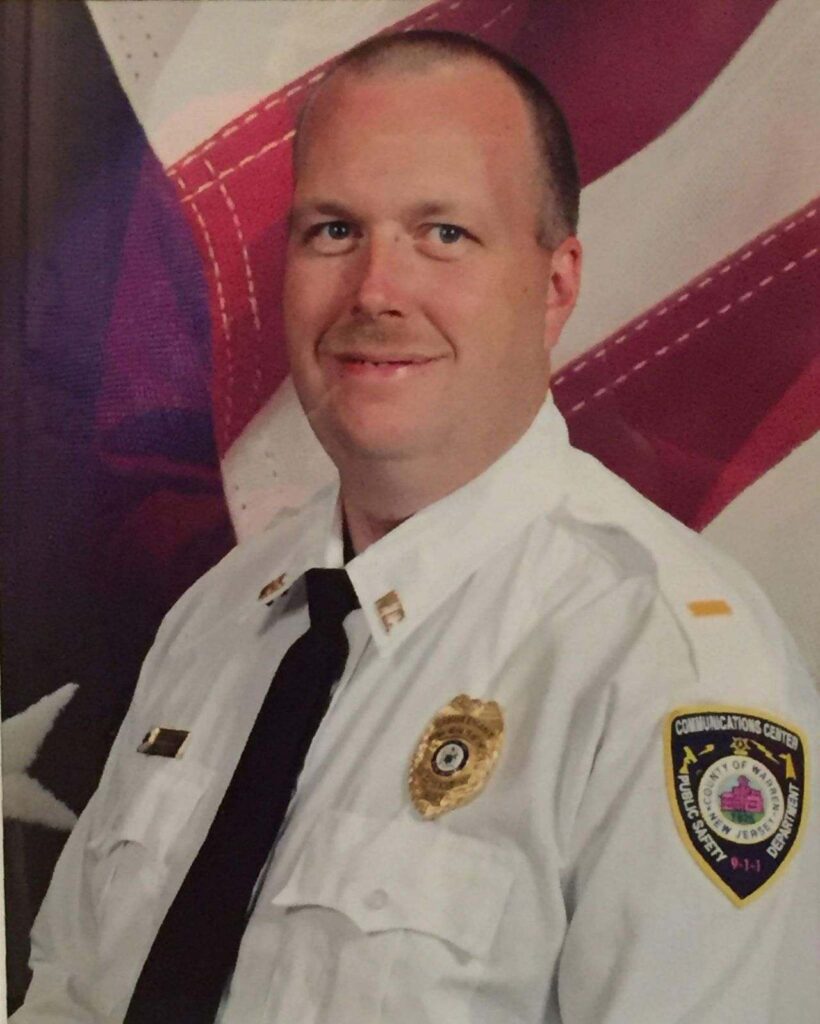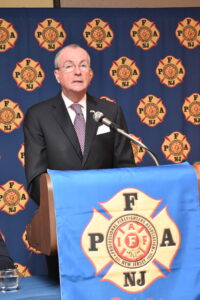Murphy Signs Workers’ Compensation Bill for Certain First Responders

[caption id="attachment_154539" align="alignleft" width="200"] Governor Murphy[/caption]
Governor Murphy[/caption]
The leading cause of line-of-duty deaths for firefighters is sudden cardiac death, which accounts for approximately 45% of all firefighter duty-related fatalities. Strenuous physical activity, emotional stress, and environmental pollutants all strain the cardiovascular and cerebrovascular system and can increase the risk of sudden cardiac and stroke events in firefighters, Emergency Medical Technicians (EMTs), and paramedics. For these first responders, sudden cardiac death and stroke are more likely to occur during or after emergency duties than at any other time.
Professional Firefighters Association of New Jersey (PFANJ) President Matthew Caliente states, “The work of our members, firefighters, EMTs, and paramedics is physical in nature, and when you add the emotional and environmental stressors that we bring home after our shift, our bodies are negatively impacted hours and days after the response is over.”
The PFANJ has worked tirelessly with legislators to draft legislation and has testified in front of multiple committees to get A5909/S4267 passed for all firefighters, EMTs, and paramedics in New Jersey (career and volunteer).
"The inspiration for this bill is Scott Danielson, an EMT with the Lakeland Ambulance Squad and brother of retired Clifton Fire Department Captain Kevin Danielson, who died from a heart attack hours after responding to a motor vehicle crash involving his daughter," said Caliente. "The Danielson family had to fight for years to be awarded compensation after Scott’s passing. What the Danielson family went through extended their grief and sorrow rom losing Scott for years, it is unfathomable that it took so long for his family to receive closure. On the eighth anniversary of his passing, with the signing of this legislation, we've ensured that no other family will have to bear that burden.”
"Often, a firefighter or EMT will be stricken in transit from serving at a fire or rescue, or just after
returning to a firehouse or home, with no witness to the heart attack or stroke. This law will give a first responder a fighting chance to get medical care and disability benefits when the process of heart attack or stroke begins on the job, but follows them home." Richard B. Rubenstein, Workers Compensation Council to the PFANJ
This bill will extend workers compensation coverage for firefighters, EMTs, and paramedics who are killed by sudden cardiac events or stroke up to 24 hours after a shift.. It provides the presumption that the medical event was a result of the work done by the firefighter, EMT, or paramedic and should reduce the burden on the first responder’s family. The PFANJ would like to thank all of our legislators who voted for these bills and acknowledged the work and sacrifice of our first responders, especially Speaker Coughlin, Sen. President Scutari, Sen. Sarlo, Sen. Oroho, Asm. DeAngelo, Asm. Wirths, and Asm. Space.
The Professional Firefighters Association of New Jersey (PFANJ), was established and chartered as a State Association by the International Association of Fire Fighters (IAFF) on October 29, 1929. It is a member of the AFL-CIO. The PFANJ represents nearly three thousand five hundred (3,500) Firefighters, Emergency Medical Technicians, Instructors, and Dispatchers though its over sixty (60) locals. Its local affiliates represent first responders who work in dispatch centers, academies, airports, fire districts, suburban municipalities, and the state’s largest and busiest urban fire departments.
Governor Phil Murphy today signed A-5909/S-4267, which revises workers' compensation coverage for certain injuries to certain volunteer and professional public safety and law enforcement personnel. The bill amends current workers’ compensation law to add that a response to an emergency, including work that is sufficient to cause certain injuries or death, is compensable.
The bill also expands those who are covered to include any career emergency medical technicians and paramedics employed by the State, a county, a municipality, or a private sector counterpart who is engaged in public emergency medical and rescue services. In addition, paid, part-paid, or volunteer firefighters and police officers and members of a volunteer first aid or rescue squad are eligible for compensation.
“Our first responders experience a tremendous amount of stress while putting their lives on the line for our safety. Worrying about compensation upon injury should not be a concern while they are providing critical emergency services,” said Governor Murphy. “Our first responders and essential workers are a top priority for our Administration, which is why I am proud to sign this bill into law today to provide these workers and their families with compensation coverage for the injuries that they sustain while they are on the job.”
"Workers' Compensation provides peace of mind to workers, who know they will receive wage replacement and medical coverage for any illness or injuries sustained during the course of their employment. This law further protects first responders – who put themselves in harm's way in order to help others – in emergency situations," said Labor Commissioner Robert Asaro-Angelo.
The primary sponsors of this bill are Senator Paul Sarlo and Assemblyman Wayne DeAngelo. Other prime sponsors of this bill include then-Assemblyman, now Senator Parker Space, former Senator Steven Oroho, and former Assemblyman Harold Wirths.
“Emergency responders have earned our support and appreciation,” said Senator Paul Sarlo, the chairman of the Senate Budget Committee and Mayor of Wood-Ridge. “They put their lives on the line to protect the safety of the residents of New Jersey and provide the immediate care that is vital for those who are injured or experiencing medical emergencies. If they suffer health emergencies of their own due to the dangers of their jobs, the responders and their families deserve the compensation they have earned. This law will bring more fairness to the workers compensation system.”
“Firefighters, police, first aid crews and others who respond to emergencies act heroically each and every day,” said Assemblyman Wayne DeAngelo. “I’m pleased to see this bill signed into law, as it will benefit both our volunteer and professional public safety and law enforcement personnel.”
“This legislation will make sure that our firefighters, police officers, and EMTs are justly compensated if they sustain injuries responding to an emergency,” said then-Assemblyman, now Senator Parker Space. “Whether you are a volunteer or a career first responder, making sure these men and women who sacrifice so much for their communities are taken care of in a time of need is paramount.”
“This is an incredibly important piece of legislation that safeguards paramedics and EMTs who are often overlooked when it comes to protections despite working in extraordinary stressful and often dangerous conditions. We deeply appreciate the governor’s support of EMS providers throughout the state and we look forward to working with him and his administration to further progress EMS in NJ,” said Ben Dafilou, Executive Director, Paramedics for the Advancement of NJ EMS.
“This law further recognizes the risks that firefighters and other first responders face when they respond to an emergency,” said Eddie Donnelly, President of the NJFMBA, representing more than 6,000 professional firefighters, EMTs, and dispatchers across New Jersey. “Many of the dangers of our jobs are obvious, others more subtle, all potentially deadly. Today the families of more first responders are protected should their loved one answer final alarm. Thank you, Governor Murphy, for once again showing your support to the men and women that keep our communities safe.”






Great job by All and the Governor For making this Bill / law Become a Blessing to All First Responders!